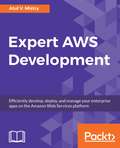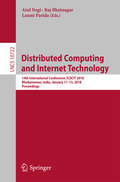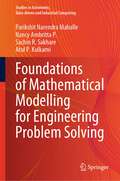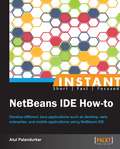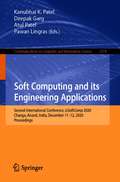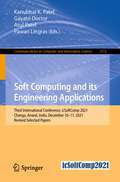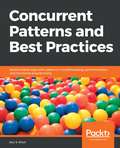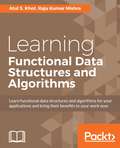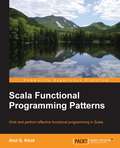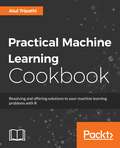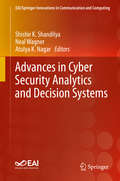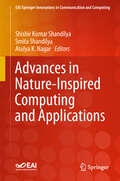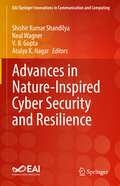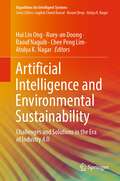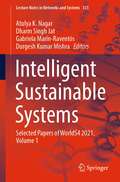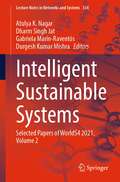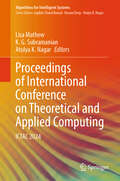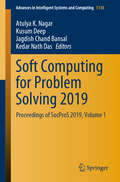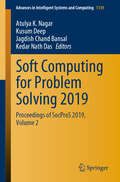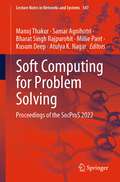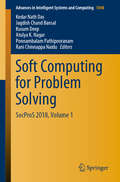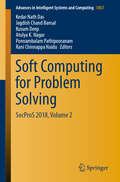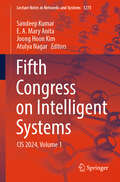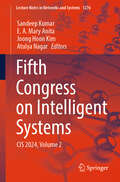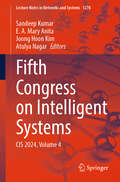- Table View
- List View
Expert AWS Development: Efficiently develop, deploy, and manage your enterprise apps on the Amazon Web Services platform
by Atul MistryKey concepts, sample applications, best practices, and troubleshooting tips to build highly scalable applications in AWS. Key FeaturesDesign highly available, cost efficient, fault tolerant, and scalable distributed systemsA practical guide that will help you build, deploy, and manage applications with ease.Develop effective solutions with AWS SDK and LambdaBook DescriptionContinuous deployment and Agile methodology have enabled huge advances in modern applications. This book will enable the reader to make use of this rapidly evolving technology to build highly scalable applications within AWS using different architectures.You will begin with installation of AWS SDK and you will get hands-on experience on creating an application using AWS Management Console and AWS Command Line Interface (CLI). Next you will be integrating Applications with AWS services such as DynamoDB, Amazon Kinesis, AWS Lambda, Amazon SQS and Amazon SWFFollowing this you will get well versed with CI/CD workflow and work with four major phases in Release processes – Source, Build, Test and Production. Next you will learn to apply AWS developer tools in your Continuous Integration (CI) and Continuous Deployment (CD) WorkFlow. Later you will learn about User Authentication using Amazon Cognito and also how you can evaluate the best architecture as per your infrastructure costs. You will learn about Amazon EC2 service and deploy an app using Amazon EC2.You will also get well versed with container service which is Amazon EC2 Container Service (Amazon ECS) and you will learn to deploy an app using Amazon ECS. Along with EC2 and ECS, you will also deploying a practical real-world example of a CI/CD application with the Serverless Application Framework which is known as AWS Lambda. Finally you will learn how to build, develop and deploy the Application using AWS Developer tools like AWS CodeCommit, AWS CodeBuild, AWS CodeDeploy and AWS CodePipeline as per project needs. Also you can develop and deploy applications within minutes using AWS CodeStar from wizard.By the end of this book, the reader will effectively build, deploy, and manage applications on AWS along with scaling and securing applications with best practices and troubleshooting tips.What you will learnLearn how to get up and running with AWS Developer Tools.Integrate the four major phases in the Release Processes. Source, Build, Test and Production.Learn how to integrate Continuous Integration, Continuous Delivery, and Continuous Deployment in AWS.Make secure, scalable and fault tolerant applications.Understand different architectures and deploy complex architectures within minutesWho this book is forThis book targets developers who would like to build and manage web and mobile applications and services on the AWS platform. If you are an architect you will be able to take a deep dive and use examples that can be readily applied to real world scenarios. Some prior programming experience is assumed along with familiarity of cloud computing.
Distributed Computing and Internet Technology
by Laxmi Parida Atul Negi Raj BhatnagarThis book constitutes the proceedings of the 13th International Conference on Distributed Computing and Internet Technology, ICDCIT 2017, held in Bhubaneswar, India, in January 2017. The 17 full papers and 3 poster papers presented together with 6 abstracts of invited talks were carefully reviewed and selected from 208 submissions (118 abstract and 90 full paper submissions). The ICDCIT conference focusses on mobile computing; analytics; distributed computing; virtual machines; access control; and security and privacy.
Foundations of Mathematical Modelling for Engineering Problem Solving (Studies in Autonomic, Data-driven and Industrial Computing)
by Parikshit Narendra Mahalle Nancy Ambritta P. Sachin R. Sakhare Atul P. KulkarniThis book aims at improving the mathematical modelling skills of users by enhancing the ability to understand, connect, apply and use the mathematical concepts to the problem at hand. This book provides the readers with an in-depth knowledge of the various categories/classes of research problems that professionals, researchers and students might encounter following which the applications of appropriate mathematical models is explained with the help of case studies. The book is targeted at academicians, researchers, students and professionals who belong to all engineering disciplines.
Instant NetBeans IDE How-to
by Atul PalandurkarFilled with practical, step-by-step instructions and clear explanations for the most important and useful tasks. Get the job done and learn as you go. This book is written in simple, easy-to-understand format with lots of screenshots and step-by-step explanations.This book is for Java developers or anyone who has basic knowledge of Java but has not used NetBeans IDE or any other IDE for developing Java applications; they can use this book to rapidly develop Java applications without much experience, just like a professional does.
Soft Computing and its Engineering Applications: Second International Conference, icSoftComp 2020, Changa, Anand, India, December 11–12, 2020, Proceedings (Communications in Computer and Information Science #1374)
by Pawan Lingras Deepak Garg Kanubhai K. Patel Atul PatelThis book constitutes the refereed proceedings of the Second International Conference on Soft Computing and its Engineering Applications, icSoftComp 2020, held in Changa, India, in December 2020. Due to the COVID-19 pandemic the conference was held online. The 24 full papers and 4 short papers presented were carefully reviewed and selected from 252 submissions. The papers present recent research on theory and applications in fuzzy computing, neuro computing, and evolutionary computing.
Soft Computing and its Engineering Applications: Third International Conference, icSoftComp 2021, Changa, Anand, India, December 10–11, 2021, Revised Selected Papers (Communications in Computer and Information Science #1572)
by Pawan Lingras Kanubhai K. Patel Atul Patel Gayatri DoctorThis book constitutes the refereed proceedings of the Third International Conference on Soft Computing and its Engineering Applications, icSoftComp 2021, held in Changa, India, in December 2021. Due to the COVID-19 pandemic the conference was held online. The 29 full papers and 4 short papers presented were carefully reviewed and selected from 247 submissions. The papers present recent research on theory and applications in fuzzy computing, neuro computing, and evolutionary computing.
Concurrent Patterns and Best Practices: Build scalable apps with patterns in multithreading, synchronization, and functional programming
by Atul S. KhotA definitive guide to mastering and implementing concurrency patterns in your applicationsKey FeaturesBuild scalable apps with patterns in multithreading, synchronization, and functional programmingExplore the parallel programming and multithreading techniques to make the code run fasterEfficiently use the techniques outlined to build reliable applicationsBook DescriptionSelecting the correct concurrency architecture has a significant impact on the design and performance of your applications. This book explains how to leverage the different characteristics of parallel architecture to make your code faster and more efficient. To start with, you'll understand the basic concurrency concepts and explore patterns around explicit locking, lock free programming, futures & actors. Then, you'll get insights into different concurrency models and parallel algorithms and put them to practice in different scenarios to realize your application's true potential. We'll take you through multithreading design patterns, such as master, slave, leader, follower, map-reduce, and monitor, also helping you to learn hands-on coding using these patterns. Once you've grasped all of this, you'll move on to solving problems using synchronizer patterns. You'll discover the rationale for these patterns in distributed & parallel applications, followed by studying how future composition, immutability and the monadic flow help create more robust code. Toward the end of the book, you'll learn about the actor paradigm and actor patterns - the message passing concurrency paradigm.What you will learnExplore parallel architecture Get acquainted with concurrency models Internalize design themes by implementing multithreading patterns Get insights into concurrent design patterns Discover design principles behind many java threading abstractions Work with functional concurrency patternsWho this book is forThis is a must-have guide for developers who want to learn patterns to build scalable and high-performing apps. It’s assumed that you already have a decent level of programming knowledge.
Learning Functional Data Structures and Algorithms
by Atul S. Khot Raju Kumar MishraLearn functional data structures and algorithms for your applications and bring their benefits to your work now About This Book • Moving from object-oriented programming to functional programming? This book will help you get started with functional programming. • Easy-to-understand explanations of practical topics will help you get started with functional data structures. • Illustrative diagrams to explain the algorithms in detail. • Get hands-on practice of Scala to get the most out of functional programming. Who This Book Is For This book is for those who have some experience in functional programming languages. The data structures in this book are primarily written in Scala, however implementing the algorithms in other functional languages should be straight forward. What You Will Learn • Learn to think in the functional paradigm • Understand common data structures and the associated algorithms, as well as the context in which they are commonly used • Take a look at the runtime and space complexities with the O notation • See how ADTs are implemented in a functional setting • Explore the basic theme of immutability and persistent data structures • Find out how the internal algorithms are redesigned to exploit structural sharing, so that the persistent data structures perform well, avoiding needless copying. • Get to know functional features like lazy evaluation and recursion used to implement efficient algorithms • Gain Scala best practices and idioms In Detail Functional data structures have the power to improve the codebase of an application and improve efficiency. With the advent of functional programming and with powerful functional languages such as Scala, Clojure and Elixir becoming part of important enterprise applications, functional data structures have gained an important place in the developer toolkit. Immutability is a cornerstone of functional programming. Immutable and persistent data structures are thread safe by definition and hence very appealing for writing robust concurrent programs. How do we express traditional algorithms in functional setting? Won't we end up copying too much? Do we trade performance for versioned data structures? This book attempts to answer these questions by looking at functional implementations of traditional algorithms. It begins with a refresher and consolidation of what functional programming is all about. Next, you'll get to know about Lists, the work horse data type for most functional languages. We show what structural sharing means and how it helps to make immutable data structures efficient and practical. Scala is the primary implementation languages for most of the examples. At times, we also present Clojure snippets to illustrate the underlying fundamental theme. While writing code, we use ADTs (abstract data types). Stacks, Queues, Trees and Graphs are all familiar ADTs. You will see how these ADTs are implemented in a functional setting. We look at implementation techniques like amortization and lazy evaluation to ensure efficiency. By the end of the book, you will be able to write efficient functional data structures and algorithms for your applications. Style and approach Step-by-step topics will help you get started with functional programming. Learn by doing with hands-on code snippets that give you practical experience of the subject.
Scala Functional Programming Patterns
by Atul S. KhotGrok and perform effective functional programming in Scala About This Book * Understand functional programming patterns by comparing them with the traditional object-oriented design patterns * Write robust, safer, and better code using the declarative programming paradigm * An illustrative guide for programmers to create functional programming patterns with Scala Who This Book Is For If you have done Java programming before and have a basic knowledge of Scala and its syntax, then this book is an ideal choice to help you to understand the context, the traditional design pattern applicable, and the Scala way. Having previous knowledge of design patterns will help, though it is not strictly necessary. What You Will Learn * Get to know about functional programming and the value Scala's FP idioms bring to the table * Solve day-to-day programming problems using functional programming idioms * Cut down the boiler-plate and express patterns simply and elegantly using Scala's concise syntax * Tame system complexity by reducing the moving parts * Write easier to reason about concurrent code using the actor paradigm and the Akka library * Apply recursive thinking and understand how to create solutions without mutation * Reuse existing code to compose new behavior * Combine the object-oriented and functional programming approaches for effective programming using Scala In Detail Scala is used to construct elegant class hierarchies for maximum code reuse and extensibility and to implement their behavior using higher-order functions. Its functional programming (FP) features are a boon to help you design "easy to reason about" systems to control the growing software complexities. Knowing how and where to apply the many Scala techniques is challenging. Looking at Scala best practices in the context of what you already know helps you grasp these concepts quickly, and helps you see where and why to use them. This book begins with the rationale behind patterns to help you understand where and why each pattern is applied. You will discover what tail recursion brings to your table and will get an understanding of how to create solutions without mutations. We then explain the concept of memorization and infinite sequences for on-demand computation. Further, the book takes you through Scala's stackable traits and dependency injection, a popular technique to produce loosely-coupled software systems. You will also explore how to currying favors to your code and how to simplify it by de-construction via pattern matching. We also show you how to do pipeline transformations using higher order functions such as the pipes and filters pattern. Then we guide you through the increasing importance of concurrent programming and the pitfalls of traditional code concurrency. Lastly, the book takes a paradigm shift to show you the different techniques that functional programming brings to your plate. This book is an invaluable source to help you understand and perform functional programming and solve common programming problems using Scala's programming patterns. Style and approach This is a hands-on guide to Scala's game-changing features for programming. It is filled with many code examples and figures that illustrate various Scala idioms and best practices.
Practical Machine Learning Cookbook
by Atul TripathiResolving and offering solutions to your machine learning problems with R About This Book • Implement a wide range of algorithms and techniques for tackling complex data • Improve predictions and recommendations to have better levels of accuracy • Optimize performance of your machine-learning systems Who This Book Is For This book is for analysts, statisticians, and data scientists with knowledge of fundamentals of machine learning and statistics, who need help in dealing with challenging scenarios faced every day of working in the field of machine learning and improving system performance and accuracy. It is assumed that as a reader you have a good understanding of mathematics. Working knowledge of R is expected. What You Will Learn • Get equipped with a deeper understanding of how to apply machine-learning techniques • Implement each of the advanced machine-learning techniques • Solve real-life problems that are encountered in order to make your applications produce improved results • Gain hands-on experience in problem solving for your machine-learning systems • Understand the methods of collecting data, preparing data for usage, training the model, evaluating the model's performance, and improving the model's performance In Detail Machine learning has become the new black. The challenge in today's world is the explosion of data from existing legacy data and incoming new structured and unstructured data. The complexity of discovering, understanding, performing analysis, and predicting outcomes on the data using machine learning algorithms is a challenge. This cookbook will help solve everyday challenges you face as a data scientist. The application of various data science techniques and on multiple data sets based on real-world challenges you face will help you appreciate a variety of techniques used in various situations. The first half of the book provides recipes on fairly complex machine-learning systems, where you'll learn to explore new areas of applications of machine learning and improve its efficiency. That includes recipes on classifications, neural networks, unsupervised and supervised learning, deep learning, reinforcement learning, and more. The second half of the book focuses on three different machine learning case studies, all based on real-world data, and offers solutions and solves specific machine-learning issues in each one. Style and approach Following a cookbook approach, we'll teach you how to solve everyday difficulties and struggles you encounter.
Advances in Cyber Security Analytics and Decision Systems (EAI/Springer Innovations in Communication and Computing)
by Atulya K. Nagar Shishir K. Shandilya Neal WagnerThis book contains research contributions from leading cyber security scholars from around the world. The authors provide comprehensive coverage of various cyber security topics, while highlighting recent trends. The book also contains a compendium of definitions and explanations of concepts, processes, acronyms, and comprehensive references on existing literature and research on cyber security and analytics, information sciences, decision systems, digital forensics, and related fields. As a whole, the book is a solid reference for dynamic and innovative research in the field, with a focus on design and development of future-ready cyber security measures. Topics include defenses against ransomware, phishing, malware, botnets, insider threats, and many others.
Advances in Nature-Inspired Computing and Applications (EAI/Springer Innovations in Communication and Computing)
by Atulya K. Nagar Shishir Kumar Shandilya Smita ShandilyaThis book contains research contributions from leading global scholars in nature-inspired computing. It includes comprehensive coverage of each respective topic, while also highlighting recent and future trends. The contributions provides readers with a snapshot of the state of the art in the field of nature-inspired computing and its application. This book has focus on the current researches while highlighting the empirical results along with theoretical concepts to provide a comprehensive reference for students, researchers, scholars, professionals and practitioners in the field of Advanced Artificial Intelligence, Nature-Inspired Algorithms and Soft Computing.
Advances in Nature-Inspired Cyber Security and Resilience (EAI/Springer Innovations in Communication and Computing)
by Atulya K. Nagar Shishir Kumar Shandilya Neal Wagner V. B. GuptaThis book presents a comprehensive reference source for dynamic and innovative research in the field of cyber security, focusing on nature-inspired research and applications. The authors present the design and development of future-ready cyber security measures, providing a critical and descriptive examination of all facets of cyber security with a special focus on recent technologies and applications. The book showcases the advanced defensive cyber security mechanism that is a requirement in the industry and highlights measures that provide efficient and fast solutions. The authors explore the potential of AI-based and nature-inspired based computing compatibilities in establishing an adaptive defense mechanism system. The book focuses on current research while highlighting the empirical results along with theoretical concepts to provide a reference for students, researchers, scholars, professionals, and practitioners in the field of cyber security and analytics. This book features contributions from leading scholars from all over the world.
Artificial Intelligence and Environmental Sustainability: Challenges and Solutions in the Era of Industry 4.0 (Algorithms for Intelligent Systems)
by Atulya K. Nagar Chee Peng Lim Hui Lin Ong Ruey-An Doong Raouf NaguibThe book discusses comprehensive and cutting-edge research and development endeavors, as well as innovative solutions, in implementing AI and related technologies to meet and undertake current and future challenges towards ensuring environmental sustainability. It explores the future research directions in the era of Industry 4.0. In the beginning, an overview of the utilization of Al for environmental sustainability is provided. The remaining chapters of the book cover the technological and application aspects of Al for environmental sustainability with illustrative examples. Finally, challenges with respect to deploying Al to solving environmental problems and the future trends are covered.
Intelligent Sustainable Systems: Selected Papers of WorldS4 2021, Volume 1 (Lecture Notes in Networks and Systems #333)
by Durgesh Kumar Mishra Atulya K. Nagar Dharm Singh Jat Gabriela Marín-RaventósThis book provides insights of World Conference on Smart Trends in Systems, Security and Sustainability (WS4 2021) which is divided into different sections such as Smart IT Infrastructure for Sustainable Society; Smart Management prospective for Sustainable Society; Smart Secure Systems for Next Generation Technologies; Smart Trends for Computational Graphics and Image Modeling; and Smart Trends for Biomedical and Health Informatics. The proceedings is presented in two volumes. The book is helpful for active researchers and practitioners in the field.
Intelligent Sustainable Systems: Selected Papers of WorldS4 2021, Volume 2 (Lecture Notes in Networks and Systems #334)
by Durgesh Kumar Mishra Atulya K. Nagar Dharm Singh Jat Gabriela Marín-RaventósThis book provides insights of World Conference on Smart Trends in Systems, Security and Sustainability (WS4 2021) which is divided into different sections such as Smart IT Infrastructure for Sustainable Society; Smart Management prospective for Sustainable Society; Smart Secure Systems for Next Generation Technologies; Smart Trends for Computational Graphics and Image Modeling; and Smart Trends for Biomedical and Health Informatics. The proceedings is presented in two volumes. The book is helpful for active researchers and practitioners in the field.
Proceedings of International Conference on Theoretical and Applied Computing: ICTAC 2024 (Algorithms for Intelligent Systems)
by Atulya K. Nagar Lisa Mathew K. G. SubramanianThis book presents research papers presented at the International Conference on Theoretical and Applied Computing 2023, held during September 13–15, 2023. ICTAC 2023 is organized by Amal Jyothi College of Engineering, India. This book covers topics, such as theoretical foundations of computing, algorithms and data structures, computer systems and architecture, computer networks and communications, graph theory, algorithms and complexity, quantum computation theory, computational geometry, software engineering and programming languages, human-computer interaction, artificial intelligence and machine learning, data mining and knowledge discovery, parallel and distributed computing, grid and cloud computing, bioinformatics/biomedical applications, data mining, evolutionary computation, fuzzy logic, genetic algorithms, natural language processing and image processing.
Soft Computing for Problem Solving 2019: Proceedings of SocProS 2019, Volume 1 (Advances in Intelligent Systems and Computing #1138)
by Kedar Nath Das Kusum Deep Jagdish Chand Bansal Atulya K. NagarThis book features the outcomes of the 9th International Conference on Soft Computing for Problem Solving, SocProS 2019, which brought together researchers, engineers and practitioners to discuss thought-provoking developments and challenges in order to identify potential future directions. The book presents the latest advances and innovations in the interdisciplinary areas of soft computing, including original research papers in areas such as algorithms (artificial immune systems, artificial neural networks, genetic algorithms, genetic programming, and particle swarm optimization) and applications (control systems, data mining and clustering, finance, weather forecasting, game theory, business and forecasting applications). It is a valuable resource for both young and experienced researchers dealing with complex and intricate real-world problems that cannot easily be solved using traditional methods.
Soft Computing for Problem Solving 2019: Proceedings of SocProS 2019, Volume 2 (Advances in Intelligent Systems and Computing #1139)
by Kedar Nath Das Kusum Deep Jagdish Chand Bansal Atulya K. NagarThis book features the outcomes of the 9th International Conference on Soft Computing for Problem Solving, SocProS 2019, which brought together researchers, engineers and practitioners to discuss thought-provoking developments and challenges in order to identify potential future directions. The book presents the latest advances and innovations in the interdisciplinary areas of soft computing, including original research papers in areas such as algorithms (artificial immune systems, artificial neural networks, genetic algorithms, genetic programming, and particle swarm optimization) and applications (control systems, data mining and clustering, finance, weather forecasting, game theory, business and forecasting applications). It is a valuable resource for both young and experienced researchers dealing with complex and intricate real-world problems that cannot easily be solved using traditional methods.
Soft Computing for Problem Solving: Proceedings of the SocProS 2022 (Lecture Notes in Networks and Systems #547)
by Millie Pant Kusum Deep Atulya K. Nagar Manoj Thakur Samar Agnihotri Bharat Singh RajpurohitThis book provides an insight into the 11th International Conference on Soft Computing for Problem Solving (SocProS 2022). This international conference is a joint technical collaboration of the Soft Computing Research Society and the Indian Institute of Technology Mandi. This book presents the latest achievements and innovations in the interdisciplinary areas of Soft Computing, Machine Learning, and Data Science. It brings together the researchers, engineers, and practitioners to discuss thought-provoking developments and challenges, in order to select potential future directions. It covers original research papers in the areas including but not limited to algorithms (artificial neural network, deep learning, statistical methods, genetic algorithm, and particle swarm optimization) and applications (data mining and clustering, computer vision, medical and healthcare, finance, data envelopment analysis, business, and forecasting applications). This book is beneficial for young as well as experienced researchers dealing across complex and intricate real-world problems for which finding a solution by traditional methods is a difficult task.
Soft Computing for Problem Solving: SocProS 2018, Volume 1 (Advances in Intelligent Systems and Computing #1048)
by Kedar Nath Das Kusum Deep Jagdish Chand Bansal Atulya K. Nagar Ponnambalam Pathipooranam Rani Chinnappa NaiduThis two-volume book presents the outcomes of the 8th International Conference on Soft Computing for Problem Solving, SocProS 2018. This conference was a joint technical collaboration between the Soft Computing Research Society, Liverpool Hope University (UK), and Vellore Institute of Technology (India), and brought together researchers, engineers and practitioners to discuss thought-provoking developments and challenges in order to select potential future directions. The book highlights the latest advances and innovations in the interdisciplinary areas of soft computing, including original research papers on algorithms (artificial immune systems, artificial neural networks, genetic algorithms, genetic programming, and particle swarm optimization) and applications (control systems, data mining and clustering, finance, weather forecasting, game theory, business and forecasting applications). It offers a valuable resource for both young and experienced researchers dealing with complex and intricate real-world problems that are difficult to solve using traditional methods.
Soft Computing for Problem Solving: SocProS 2018, Volume 2 (Advances in Intelligent Systems and Computing #1057)
by Kedar Nath Das Kusum Deep Jagdish Chand Bansal Atulya K. Nagar Ponnambalam Pathipooranam Rani Chinnappa NaiduThis two-volume book presents the outcomes of the 8th International Conference on Soft Computing for Problem Solving, SocProS 2018. This conference was a joint technical collaboration between the Soft Computing Research Society, Liverpool Hope University (UK), and Vellore Institute of Technology (India), and brought together researchers, engineers and practitioners to discuss thought-provoking developments and challenges in order to select potential future directions. The book highlights the latest advances and innovations in the interdisciplinary areas of soft computing, including original research papers on algorithms (artificial immune systems, artificial neural networks, genetic algorithms, genetic programming, and particle swarm optimization) and applications (control systems, data mining and clustering, finance, weather forecasting, game theory, business and forecasting applications). It offers a valuable resource for both young and experienced researchers dealing with complex and intricate real-world problems that are difficult to solve using traditional methods.
Fifth Congress on Intelligent Systems: CIS 2024, Volume 1 (Lecture Notes in Networks and Systems #1275)
by Sandeep Kumar Atulya Nagar Joong Hoon Kim E. A. Mary AnitaThis book is a collection of selected papers presented at the Fifth Congress on Intelligent Systems (CIS 2024), organized by CHRIST (Deemed to be University), Bangalore, India, under the technical sponsorship of the Soft Computing Research Society, India, during September 4–5, 2024. The book covers high-quality research articles in the fields of soft computing, machine vision, robotics, computational intelligence, artificial intelligence, signal and image processing, data science techniques, and their real-world applications which are some of the recent advancements in the real-world technologies.
Fifth Congress on Intelligent Systems: CIS 2024, Volume 2 (Lecture Notes in Networks and Systems #1276)
by Sandeep Kumar Atulya Nagar Joong Hoon Kim E. A. Mary AnitaThis book is a collection of selected papers presented at the Fifth Congress on Intelligent Systems (CIS 2024), organized by CHRIST (Deemed to be University), Bangalore, India, under the technical sponsorship of the Soft Computing Research Society, India, during September 4–5, 2024. The book covers high-quality research articles in the fields of soft computing, machine vision, robotics, computational intelligence, artificial intelligence, signal and image processing, data science techniques, and their real-world applications which are some of the recent advancements in the real-world technologies.
Fifth Congress on Intelligent Systems: CIS 2024, Volume 4 (Lecture Notes in Networks and Systems #1278)
by Sandeep Kumar Atulya Nagar Joong Hoon Kim E. A. Mary AnitaThis book is a collection of selected papers presented at the Fifth Congress on Intelligent Systems (CIS 2024), organized by CHRIST (Deemed to be University), Bangalore, India, under the technical sponsorship of the Soft Computing Research Society, India, during September 4–5, 2024. The book covers high-quality research articles in the fields of soft computing, machine vision, robotics, computational intelligence, artificial intelligence, signal and image processing, data science techniques, and their real-world applications which are some of the recent advancements in the real-world technologies.
